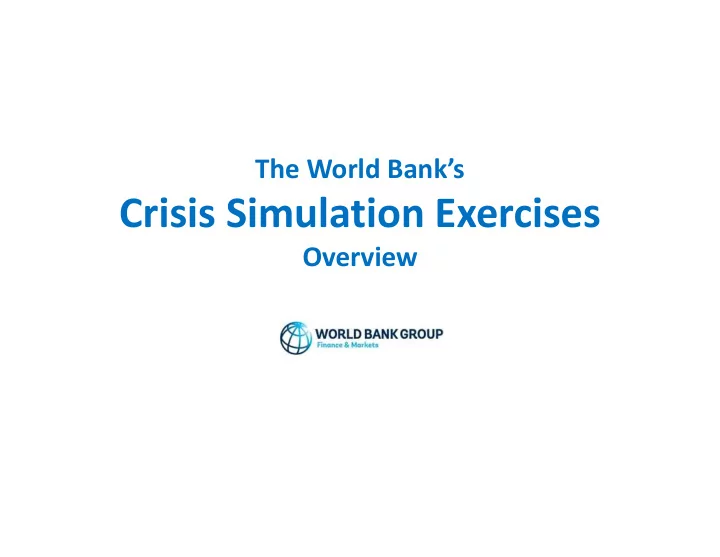

The World Bank’s Crisis Simulation Exercises Overview
“The authorities can run all kinds of stress tests on the capital structures of the world’s largest banks, trying to predict how well they would bear losses in a future crisis. The stress test they really need to run is on themselves – whether they will stick to their promise to work nicely with each other or will revert to self ‐ interest.” John Gapper Financial Times, Nov 12, 2014 2
Agenda • What is a Crisis Simulation Exercise (CSE)? • How do CSEs work? • Types of CSEs • WB CSEs around the World • CSE projects and output 3
What is a Crisis Simulation Exercise? • Simulations are games to assess the preparedness of financial sector authorities to handle crises. • Simulations: Explore limits to information ‐ sharing and • coordination, and the institutional decision making process. Provide opportunity for authorities to practice • taking decisions in dealing with problems elevating to crisis situations 4
How do our simulations work? • A team of the World Bank and representatives from the local financial sector authorities prepare the exercise’s scenario. • The scenario is a sequence of brief, public and private messages describing problems evolving over an extended period of time. 5
TEAM 2 TEAM 1 Interaction Participant Roles: “Role Players” deliver the scenario by playing various fictional characters “Players” take decisions for entities they represent Modes of Communication: Administrator/ Role Players Public Info = Monitor the News site Private Info = Emails from the administrator to one team only Email Interaction between and among players TEAM 4 TEAM 3
How our simulations work? (3) • Teams receiving private messages must decide what to share with the other teams and when to share it. • In making decisions about sharing information, the teams can ask their staff for input. • Each team takes its decisions regarding the banks under their jurisdiction according to their legal framework. • Communication is via Email – a set list of email addresses (staff, banks, press, and other jurisdictions’ authorities) 7
Types of Simulations • Single Agency • National level, multi ‐ agency • Multi ‐ jurisdictional 8
Sample Participating Teams: Single agency exercise Governor/Board Administrator Operations Supervision (RolePlayers) Financial Legal Stability
Sample Participating Teams: National level, multi ‐ agency exercise Financial Board Stability Market Administrator Supervision Operations (RolePlayers) Deposit Ministry of Guarantee Finance Fund
Sample Participating Teams: Multi ‐ jurisdictions exercise Country A Country B Administrator Country C Country D (RolePlayers) Country E Country F
WB CSEs around the World: • 32 exercises to ‐ date: 27 single ‐ jurisdiction scenarios in 25 countries and 5 multi ‐ jurisdiction scenarios (in Latin America, Europe, and Asia) – Funded by FIRST, FinSAC (Vienna), and others such as the Toronto Center. • Types of issues in CSEs: – Communication strategy in times of crisis; Home ‐ Host supervision; Central bank liquidity facilities in times of stress; Cybersecurity; fit and proper criteria; coordination among different regulators 12
CSE Projects Process BUILDING PLANNING RUNNING REPORTING Gather info Decide type of Introduction Review & • • • • simulation and draft Play analyze • Scenario and Decide level of Debrief written • • materials participation record of Build & test Designate exercise • • IT platform dedicated local Prepare & • staff for Secure venue deliver report • & IT logistics “Control Team”
CSE Output • The interaction generates between 250 and 600 emails. • Posterior analysis of the emails provides insights on how decisions are taken and could be improved, and on possible legal, regulatory, and operational reforms. 14
Email Analysis ‐ Example 1 Metadata of who talks to whom, how frequently reveals extent of information ‐ sharing.
Metadata Example 2 16
Questions? Please contact: Aquiles Almansi, Lead Financial Sector Specialist aalmansi@worldbank.org 17
Recommend
More recommend